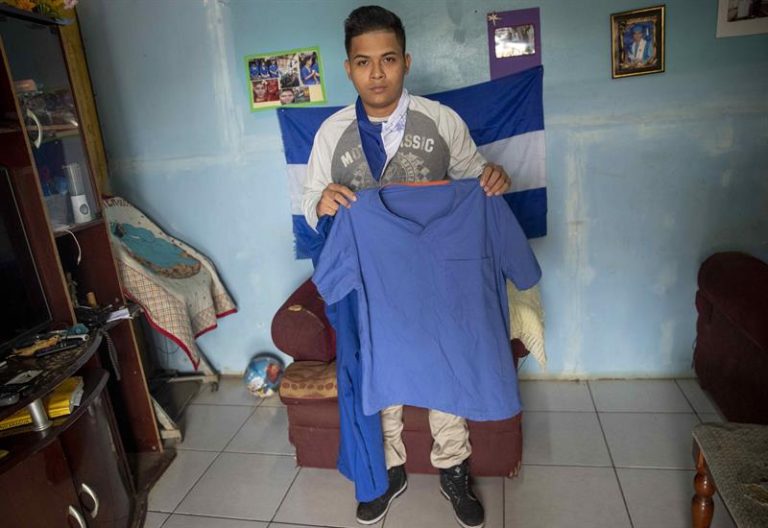22 de marzo 2019

European Concern over Lack of Academic Freedom in Nicaragua

PUBLICIDAD 1M
PUBLICIDAD 4D
PUBLICIDAD 5D
College student Jorge Zapata, released after eight months in prison for protesting against the government, describes threats and abuse in prison.

College student Jorge Zapata
The Nicaraguan “civic insurrection” has spawned hundreds of political prisoners and this is the welcome message they get when entering prison: “They told us that if Nicaraguans rise up civically again, they will kill all of us without even thinking about it.”
These are the words of Jorge Zapata, a recently released student who just spent eight months in prison for protesting against the government. Zapata did not tell EFE this until after finishing the interview; he was so bewildered after being in prison that he had forgotten that this was important.
Zapata and 15 other college students were threatened when they entered the largest and highest-security prison in Nicaragua, La Modelo, after they had been beaten during interrogations in El Chipote, the police headquarters that has been denounced as a torture center.
The student confirmed that these threats were made and added: “We believe that they are capable of this…because they can invoke the “Escape Law” which states that if you try to escape the prison system, they have the right to kill you. This “Escape Law” is an assassination law.
The 20-year-old said he was afraid, above all for his family. He realized he could die from one bullet when he survived the July 13 attacks by police and para-police on the National Autonomous University of Nicaragua (UNAN-Managua) and the Divine Providence parish church. Police used rocket-propelled grenade launchers in that attack killing two students.
Zapata—one of 762 political prisoners in the opposition whom Ortega calls “terrorists” or “coup-mongers,” confirmed the accounts from others who affirm that there are foreigners, specifically Cubans, among the “combined security forces.”
He said that he saw one of the Cubans: “On Friday July 13. He had an M-16 and was firing like crazy.”
During the most violent phase of the crisis, protesters used homemade mortars against the government’s military-grade weaponry which included rocket-grenade launchers, AKA assault rifles, PKM machine guns, M16 military rifles and Dragunov sniper rifles, according to organizations like Amnesty International.
According to the Inter-American Commission on Human Rights (IACHR), 325 died because of the violence. Ortega recognizes 199 deaths.
The worst thing in prison was not the airless cells, without water, or the horrible food, but that it contained “broken glass, aluminum, pieces of iron and cockroaches,” Zapata said.
Some prisoners are shitting blood, Zapata said. He stopped eating the meals served in “La Modelo,” and only ate what his family sent to him.
Every time there is a protest or an emissary comes to Nicaragua from the Organization of American States, European Union or the United States–to try and resolve the political crisis–the prison guards react violently beating the prisoners, he said.
On February 19, prisoners threw plastic baggies filled with powdered drinks and soap at guards to try and stop the beating of other prisoners. The guards responded by beating them in their cells.
On the morning of March 7, they heard that protesting prisoners in the “El Infiernillo” (Little Hell) dungeon, the worst in the country, called for help because their jailers hurled tear gas into the cells and shut the windows. Some prisoners busted a hole in the roof and raised the Nicaraguan flag, which prison authorities [just as the Police on the streets] have forbidden, as well as the national anthem.
“This is something they really do not like. And I just don’t understand it because they are Nicaraguans just like all the rest of us,” the student said, adding that there are flags of the official party, the Sandinista National Liberation Front (FSLN), flying inside the prison.
Zapata was sentenced last November to 16 years in prison for “terrorism.” When asked if he is a terrorist, he responded categorically: “Not for a single moment.” He said he wants to see a different Nicaragua, without corruption, “without all these things that just benefit the government.”
He is still adjusting to the world outside the concrete of the prison walls and the new forms of protest. He has his doubts about it all. And it seems strange that his mattress actually bends to his body when he lies down at night.
Archivado como:
PUBLICIDAD 3M
Confidencial es un diario digital nicaragüense, de formato multimedia, fundado por Carlos F. Chamorro en junio de 1996. Inició como un semanario impreso y hoy es un medio de referencia regional con información, análisis, entrevistas, perfiles, reportajes e investigaciones sobre Nicaragua, informando desde el exilio por la persecución política de la dictadura de Daniel Ortega y Rosario Murillo.
PUBLICIDAD 3D